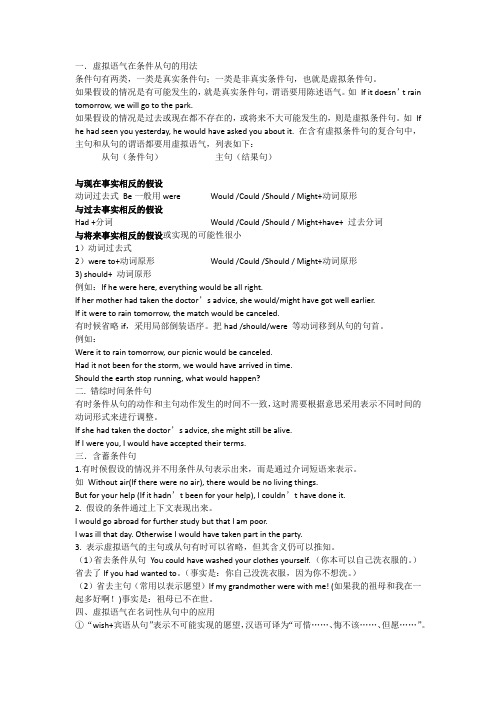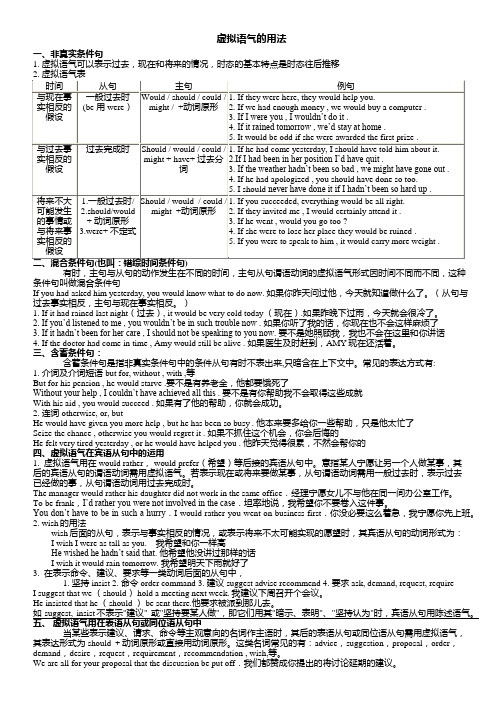虚拟语气讲解及练习题(含答案和解释)
虚拟语气讲解及练习(有答案)

高中英语虚拟语气讲解及练习虚拟条件句就是对现实条件的一种虚拟假设,所假设的条件一般不符合事实或与事实相反或在现实中发生的可能性极小。
根据时间的不同,虚拟条件句可分为三种,即与现在事实相反的虚拟条件句、与过去事实相反的虚拟条件句(1)表示与现在事实相反If I had enough money now, I would lend it to you.(2)表示与过去事实相反If he had taken your advice, he wouldn’t have made such a bad mistake.(3)表示与将来事实相反I would go shopping with you if it were to be Sunday tomorrow.1. 虚拟条件句的倒装在虚拟条件句中,为了强调所假设条件的虚拟性,或突出说话人的一种主观愿望,虚拟条件句可用倒装结构。
虚拟条件句的倒装是通过去掉if,把条件从句谓语中的助动词、情态动词或系动词放在句首实现的。
例如:Had I been(= If I had been ) in that situation, I would not have let the thief escape away with so much money.Should there be (= If there should be) a drought, what should we do at that time ?2. 错综时间条件句有时条件从句的动作和主句的动作发生的时间并不一致,这时谓语动词的形式应根据它所要表示的具体时间来确定。
例如:If we hadn’t been working hard in the past few years ,thing s wouldn’t be going so smoothly.3. 含蓄条件句有时假设的情况并不以条件从句的形式表现出来,而是通过某个介词或介词短语(如:with,otherwise,without,but for,in that position)、上下文或其它方式表现出来。
虚拟语气讲解和练习(附答案)

高中英语虚拟语气讲解及练习虚拟条件句就是对现实条件的一种虚拟假设,所假设的条件一般不符合事实或与事实相反或在现实中发生的可能性极小。
根据时间的不同,虚拟条件句可分为三种,即与现在事实相反的虚拟条件句、与过去事实相反的虚拟条件句(1)表示与现在事实相反If I had enough money now, I would lend it to you.(2)表示与过去事实相反If he had taken your advice, he wouldn’t have made such a bad mistake.(3)表示与将来事实相反I would go shopping with you if it were to be Sunday tomorrow.1. 虚拟条件句的倒装在虚拟条件句中,为了强调所假设条件的虚拟性,或突出说话人的一种主观愿望,虚拟条件句可用倒装结构。
虚拟条件句的倒装是通过去掉if,把条件从句谓语中的助动词、情态动词或系动词放在句首实现的。
例如:Had I been(= If I had been ) in that situation, I would not have let the thief escape away with so much money.Should there be (= If there should be) a drought, what should we do at that time ?2. 错综时间条件句有时条件从句的动作和主句的动作发生的时间并不一致,这时谓语动词的形式应根据它所要表示的具体时间来确定。
例如:If we hadn’t been working hard in the past few years ,thing s wouldn’t be going so smoothly.3. 含蓄条件句有时假设的情况并不以条件从句的形式表现出来,而是通过某个介词或介词短语(如:with,otherwise,without,but for,in that position)、上下文或其它方式表现出来。
虚拟语气详解及练习附答案

虚拟语气详解及练习附答案虚拟语气1)概念虚拟语气用来表示说话人的主观愿望或假想,所说的是一个条件,不一定是事实,或与事实相反。
2)在条件句中的应用条件句可分为两类,一类为真实条件句,一类为非真实条件句。
非真实条件句表示的是假设的或实际可能性不大的情况,故采用虚拟语气。
1 真实条件句真实条件句用于陈述语气,假设的情况可能发生,其中if 是如果的意思。
时态关系句型:条件从句主句一般现在时shall/will + 动词原形If he comes, he will bring his violin.典型例题The volleyball match will be put off if it ___.A.will rainB. rainsC. rainedD. is rained答案B。
真实条件句主句为将来时,从句用一般现在时。
注意:1)在真实条件句中,主句不能用be going to表示将来,该用shall, will.(错) If you leave now, you are never going to regret it.(对) If you leave now, you will never regret it.2)表示真理时,主句谓语动词便不用shall (will) +动词原形,而直接用一般现在时的动词形式。
2 非真实条件句1)时态:可以表示过去,现在和将来的情况。
它的基本特点是时态退后。
a.同现在事实相反的假设。
句型:条件从句主句一般过去时should( would) +动词原形If they were here, they would help you.b.表示于过去事实相反的假设。
句型:条件从句主句过去完成时should(would) have+ 过去分词If she had worked harder, she would have succeeded.The rice would not have been burnt if you had been more careful.If my lawyer had been here last Saturday, he would have prevented me from going.If he had come yesterday, I should / would have told him about it.含义:He did not come yesterday, so I did not tell him about it.If he had not been ill and missed many classes, he would have made greater progress.含义:He was ill and missed many lessons, so he did not make greater progress.c.表示对将来的假想句型:条件从句主句一般过去时should+ 动词原形were+ 不定式would + 动词原形should+ 动词原形If you succeeded, everything would be all right.If you should succeed, everything would be all right.If you were to succeed, everything would be all right.3 混合条件句主句与从句的动作发生在不同的时间,这时主,从句谓语动词的虚拟语气形式因时间不同而不同,这叫做混合条件句。
虚拟语气讲解及练习

一.虚拟语气在条件从句的用法条件句有两类,一类是真实条件句;一类是非真实条件句,也就是虚拟条件句。
如果假设的情况是有可能发生的,就是真实条件句,谓语要用陈述语气。
如If it doesn’t rain tomorrow, we will go to the park.如果假设的情况是过去或现在都不存在的,或将来不大可能发生的,则是虚拟条件句。
如If he had seen you yesterday, he would have asked you about it. 在含有虚拟条件句的复合句中,主句和从句的谓语都要用虚拟语气,列表如下:从句(条件句)主句(结果句)与现在事实相反的假设动词过去式Be一般用were Would /Could /Should / Might+动词原形与过去事实相反的假设Had +分词Would /Could /Should / Might+have+ 过去分词与将来事实相反的假设或实现的可能性很小1)动词过去式2)were to+动词原形Would /Could /Should / Might+动词原形3) should+ 动词原形例如:If he were here, everything would be all right.If her mother had taken the doctor’s advice, she would/might have got well earlier.If it were to rain tomorrow, the match would be canceled.有时候省略if,采用局部倒装语序。
把had /should/were 等动词移到从句的句首。
例如:Were it to rain tomorrow, our picnic would be canceled.Had it not been for the storm, we would have arrived in time.Should the earth stop running, what would happen?二. 错综时间条件句有时条件从句的动作和主句动作发生的时间不一致,这时需要根据意思采用表示不同时间的动词形式来进行调整。
虚拟语气讲解及练习(有答案)

高中英语虚拟语气讲解及练习虚拟条件句就是对现实条件的一种虚拟假设,所假设的条件一般不符合事实或与事实相反或在现实中发生的可能性极小。
根据时间的不同,虚拟条件句可分为三种,即与现在事实相反的虚拟条件句、与过去事实相反的虚拟条件句(1)表示与现在事实相反If I had enough money now, I would lend it to you.(2)表示与过去事实相反If he had taken your advice, he wouldn’t have made such a bad mistake.(3)表示与将来事实相反I would go shopping with you if it were to be Sunday tomorrow.1. 虚拟条件句的倒装在虚拟条件句中,为了强调所假设条件的虚拟性,或突出说话人的一种主观愿望,虚拟条件句可用倒装结构。
虚拟条件句的倒装是通过去掉if,把条件从句谓语中的助动词、情态动词或系动词放在句首实现的。
例如:Had I been(= If I had been ) in that situation, I would not have let the thief escape away with so much money.Should there be (= If there should be) a drought, what should we do at that time ?2. 错综时间条件句有时条件从句的动作和主句的动作发生的时间并不一致,这时谓语动词的形式应根据它所要表示的具体时间来确定。
例如:If we hadn’t been working hard in the past few years ,thing s wouldn’t be going so smoothly.3. 含蓄条件句有时假设的情况并不以条件从句的形式表现出来,而是通过某个介词或介词短语(如:with,otherwise,without,but for,in that position)、上下文或其它方式表现出来。
虚拟语气讲解以及练习

虚拟语气的用法一、非真实条件句1. 虚拟语气可以表示过去,现在和将来的情况,时态的基本特点是时态往后推移有时,主句与从句的动作发生在不同的时间,主句从句谓语动词的虚拟语气形式因时间不同而不同,这种条件句叫做混合条件句If you had asked him yesterday, you would know what to do now. 如果你昨天问过他,今天就知道做什么了。
(从句与过去事实相反,主句与现在事实相反。
)1. If it had rained last night(过去), it would be very cold today (现在).如果昨晚下过雨,今天就会很冷了。
2. If you’d listened to me , you wouldn’t be in such trouble now . 如果你听了我的话,你现在也不会这样麻烦了3. If it hadn’t been for her care , I should not be speaking to you now. 要不是她照顾我,我也不会在这里和你讲话4. If the doctor had come in time , Amy would still be alive . 如果医生及时赶到,AMY现在还活着。
三、含蓄条件句:含蓄条件句是指非真实条件句中的条件从句有时不表出来,只暗含在上下文中。
常见的表达方式有:1. 介词及介词短语 but for, without , with ,等But for his pension , he would starve .要不是有养老金,他都要饿死了Without your help , I couldn’t have achieved all this . 要不是有你帮助我不会取得这些成就With his aid , you would succeed . 如果有了他的帮助,你就会成功。
虚拟语气讲解和练习(附答案)

高中英语虚拟语气讲解及练习虚拟条件句就是对现实条件的一种虚拟假设,所假设的条件一般不符合事实或与事实相反或在现实中发生的可能性极小。
根据时间的不同,虚拟条件句可分为三种,即与现在事实相反的虚拟条件句、与过去事实相反的虚拟条件句(1)表示与现在事实相反If I had enough money now, I would lend it to you.(2)表示与过去事实相反If he had taken your advice, he wouldn’t have made such a bad mistake.(3)表示与将来事实相反I would go shopping with you if it were to be Sunday tomorrow.1. 虚拟条件句的倒装在虚拟条件句中,为了强调所假设条件的虚拟性,或突出说话人的一种主观愿望,虚拟条件句可用倒装结构。
虚拟条件句的倒装是通过去掉if,把条件从句谓语中的助动词、情态动词或系动词放在句首实现的。
例如:Had I been(= If I had been ) in that situation, I would not have let the thief escape away with so much money.Should there be (= If there should be) a drought, what should we do at that time ?2. 错综时间条件句有时条件从句的动作和主句的动作发生的时间并不一致,这时谓语动词的形式应根据它所要表示的具体时间来确定。
例如:If we hadn’t been working hard in the past few years ,thing s wouldn’t be going so smoothly.3. 含蓄条件句有时假设的情况并不以条件从句的形式表现出来,而是通过某个介词或介词短语(如:with,otherwise,without,but for,in that position)、上下文或其它方式表现出来。
虚拟语气讲解及练习题(含答案和解释)

高中英语虚拟语气讲解及练习虚拟条件句就是对现实条件的一种虚拟假设,所假设的条件一般不符合事实或与事实相反或在现实中发生的可能性极小。
根据时间的不同,虚拟条件句可分为三种,即与现在事实相反的虚拟条件句、与过去事实相反的虚拟条件句(1)表示与现在事实相反If I had enough money now, I would lend it to you.(2)表示与过去事实相反If he had taken your advice, he wouldn’t have made such a bad mistake.(3)表示与将来事实相反I would go shopping with you if it were to be Sunday tomorrow.1. 虚拟条件句的倒装在虚拟条件句中,为了强调所假设条件的虚拟性,或突出说话人的一种主观愿望,虚拟条件句可用倒装结构。
虚拟条件句的倒装是通过去掉if,把条件从句谓语中的助动词、情态动词或系动词放在句首实现的。
例如:Had I been(= If I had been ) in that situation, I would not have let the thief escape away with so much money.Should there be (= If there should be) a drought, what should we do at that time ?2. 错综时间条件句有时条件从句的动作和主句的动作发生的时间并不一致,这时谓语动词的形式应根据它所要表示的具体时间来确定。
例如:If we hadn’t been working hard in the past few years ,thing s wouldn’t be going so smoothly.3. 含蓄条件句有时假设的情况并不以条件从句的形式表现出来,而是通过某个介词或介词短语(如:with,otherwise,without,but for,in that position)、上下文或其它方式表现出来。
- 1、下载文档前请自行甄别文档内容的完整性,平台不提供额外的编辑、内容补充、找答案等附加服务。
- 2、"仅部分预览"的文档,不可在线预览部分如存在完整性等问题,可反馈申请退款(可完整预览的文档不适用该条件!)。
- 3、如文档侵犯您的权益,请联系客服反馈,我们会尽快为您处理(人工客服工作时间:9:00-18:30)。
一. 简介虚拟语气用来表示说话人的主观愿望或假想,而不表示客观存在的事实,所说的是一个条件,不一定是事实,或与事实相反。
虚拟语气通过谓语动词的特殊形式来表示。
英语中的语气分为陈述语气、祈使语气、虚拟语气三类。
二. 应用条件虚拟语气常在表示条件和结果的状语从句中。
在表示与事实相反的虚拟语气时动词有三种时态:现在时,过去时,将来时,过去完成时,现在完成时。
在条件句中的应用:条件句可分为两类,一类为真实条件句,一类为非真实条件句。
非真实条件句表示的是假设的或实际可能性不大的情况,故采用虚拟语气。
虚拟语气在什么情况下用虚拟语气? 在表示虚假的、与事实相反的或难以实现的情况时用虚拟语气,表示主观愿望或表示某种强烈情感时,也用虚拟语气。
即当一个人说话时欲强调其所说的话是基于自己的主观想法,而不是根据客观实际,就用虚拟语气。
三. 虚拟语气在非真实条件状语从句中的用法1、真实条件状语从句与非真实条件状语从句真eg . If he doesn’t hurry up, he will miss the bus. 如果他不快点,他将错过巴士。
( 真实条件状语)(不是虚拟语气)If he is free, he will ask me to tell stories. 如果他是空闲的,他会要求我讲故事。
(真实条件状语)(不是虚拟语气)非真eg. If I were you, I would go at once.如果我是你,我马上就会去。
(非真实条件状语从句)If there were no air, people would die. 如果没有空气,人就会死亡。
(非真实条件状语从句)2、用法及动词形式1、表示与现在事实相反的情况:if+主语+过去时+其他+主语+should/would/could/might+do+其他例: 1.If I were you, I would take an umbrella.如果我是你,我会带把伞。
(事实:我不可能是你) 2.If I knew his telephone number, I would tell you. 如果我知道他的电话号码,我就会告诉你。
(事实:不知道) 3.If there were no air or water, there would be no living things on the earth. 如果没有水和空气,地球上就不会有生物。
(事实:地球上既有空气也有水) 4.If I had any money with me, I could lend you some. 如果我带钱了,我就会借给你些。
(事实:没带钱) 5.If he studied harder, he might pass the exam.如果他再努力些,就能通过考试了。
(事实:没有努力2、表示与过去事实相反的情况if+主语+had done +其他+主语+should/would/could/might+have done+其他例: 1. If I had got there earlier, I should/could have met her. 如果我早到那儿,我就会见到她。
(事实:去晚了) 2.If he had taken my advice, he would not have made such a mistake. 如果他听我的劝告的话,就不会犯这样的错误了。
(事实:没有听我的话)3、表示对将来情况的主观推测①if+主语+were to do+sth.+主语+should/would/could/might+do+其他②if+主语+did/be(were)+sth.+主语+should/would/could/might+do+其他③if+主语+should+do+sth.+主语+should/would/could/might+do+其他例: 1.If he should come here tomorrow, I should/would talk to him. 如果他哪天来这儿的话,我就跟他谈谈。
(事实:来的可能性很小) 2.If there were a heavy snow next Sunday, we would not go skating. 如果下周日下大雪,我们就不能去滑冰了。
(事实:不知能否下雪) 3.If she were to be there next Monday, I would tell her about the matter. 如果她下周一来这儿的话,我就会告诉她这件事的始末。
在表示建议、命令、要求等含义的宾语从句,谓语动词常用虚拟语气,"should+动词原形"构成,should 可省略。
4、有时,虚拟条件句中,结果主句和条件从句的谓语动作若不是同时发生时,虚拟语气的形式应作相应的调整。
①从句的动作与过去事实相反,而主句的动作与现在或现在正在发生的事实不符。
如:If I had worked hard at school, I would be an engineer, too. 如果我在学校学习刻苦的话,我现在也会成为一个工程师了If they had informed us, we would not come here now. 如果他们通知过我们的话,我们现在就不会来这里了。
②从句的动作与现在事实相反,而主句的动作与过去事实不符。
如:If he were free today, we would have sent him to Beijing. 如果他今天有空的话,我们会已经派他去北京了。
If he knew her, he would have greeted her. 要是他认识她的话,他肯定会去问候她了。
③从句的动作与过去发生的情况相反,而主句的动作与现在正在发生的情况相反。
如:If it had not been raining too much, the crops would be growing much better. 如果天不下太多的雨的话,庄稼会长得更好。
If he had been working hard, he would be working in the office now. 要是他一直努力工作的话,他现在已进了办公室了。
5、当虚拟条件句的谓语动词含有were, should, had时,if可以省略,这时条件从句要用倒装语序,即将were, should, had等词置于句首,这种多用于书面语。
如:Should he agree to go there, we would send him there. 要是他答应去的话,我们就派他去。
Were she here, she would agree with us. 如果她在这儿的话,她会同意我们的。
Had he learnt about computers, we would have hired him to work here. 如果她懂一些电脑知识的话,我们已经聘用他来这里工作了。
6、非真实条件句中的条件从句有时不表达出来,只暗含在副词、介词短语、上下文或其他方式表示出来,这种句子叫做含蓄条件句,在多数情况下,条件会暗含在短语中,如without…., but for….等But for his help, we would be working now. 要不是他的帮助,我们还会在工作呢。
Without your instruction, I would not have made such great progress. 要是没有你的指导,我不会取得如此大的进步。
We didn’t know his telephone number; otherwise we would have telephoned him. 我们不知道他的电话号码,否则我们就会给他打电话。
7、有时,虚拟条件句中,主、从句可以省略其中的一个,来表示说话人的一种强烈的感情。
①省略从句He would have finished it. 他本该完成了。
You could have passed this exam. 你应该能通过这次考试了。
②省略主句If I were at home now. 要是我现在在家里该多好啊。
If only I had got it. 要是我得到它了该多好啊。
、虚拟语气(Subjunctive Mood)的其他用法1、虚拟语气用在wish 后的宾语从句a、表示与现在事实相反的愿望,谓语动词用过去式eg. I wish I had your brains.我希望我有你那样的头脑。
(事实:我根本比不上你)b、表示与过去事实相反的愿望,谓语动词:had+done(动词过去分词)eg:.I wish I had known the truth of the matter.我希望我原来知道这件事的真相。
(事实:原来不知道)c、表示将来难以实现的愿望谓语动词:should/would + 动词原形eg. I wish I should have a chance again.我希望我还能有一次这样的机会。
(事实:很难再有这样的机会了)(注:if only和as if/as though也有相同用法)2、虚拟语气用在目的状语从句中1.在for fear that, in case, lest引导的,若用虚拟语气时,从句谓语为:should + 动词原形。
并且should不能省略She examined the door again for fear that a thief should come in. 她又把门检查了一遍,以防盗贼的进入。
He started out earlier lest he should be late. 他很早就出发了以防迟到。
2、在so that, in order that所引导的目的状语从句中,从句中的谓语为:can / may / could / might / will / would / should + 动词原形。
He goes closer to the speaker so that he can hear him clearer. 他走近说话的人以便能听得更清楚。
He read the letter carefully in order that he should not miss a word. 他把信读得很仔细以便不漏掉一个单词。
3、虚拟语气的其他用法1、一想要(desire)二宁愿(prefer)三命令(order. command)四建议(advice. suggest. propose)五要求(demand. require. request. desire.insist)中,无论主句谓语动词为何种时态,从句的谓语动词都用:“should + 动词原形”或只用“动词原形”。
